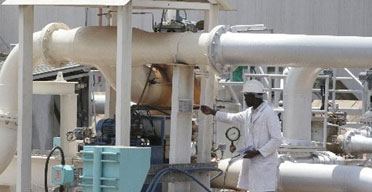NAIROBI, Kenya, May 12 – Kenya Pipeline Company (KPC) has moved to restore confidence in collateral management agreements for financing importation of refined petroleum products through new procedures.
The company aims to seal loopholes that led to banks’ loss of confidence in the Collateral Management Agreement (CMA) system after fuel was irregularly released to Triton Petroleum Company last year, without the authority of financiers, putting about Sh7.6 billion loans at risk.
The State-run corporation has been forced to review the Collateral Finance Agreement (CFA) processes because banks rely on it as trust agents for stocks financed under the CMA system for importation of crude oil and refined fuel products.
KPC’s acting Managing Director Selest Kilinda says approval for fuel release and authentication procedures from external parties have now been improved after a forensic audit undertaken by local auditing firm Price WaterHouse Coopers.
The report was released to KPC, the Energy Ministry and the country’s anti graft body -the Kenya Anti Corruption Commission (KACC) – but its contents are yet to be made public.
According to KPC’s collateral finance agreements, when oil marketers bring product into the country, they must sign an agreement with KPC. The agreement states that oil within the KPC system can only be released with the authority and instructions of the financiers of that consignment.
It further explicitly states that KPC shall release the type and quantity of oil only upon receipt of duly signed instructions from the financier’s authorised signatories.
It also obliges KPC to release regular statements on stocks held in trust at agreed intervals to the marketers, with the consent of financiers.
The CFA was introduced to allow into the industry, independent players unable to import commercially viable quantities.
But Triton-an independent market player with just under two percent of Kenya ’s market share colluded with KPC employees to craft a scheme that saw release of millions of litres of fuel without authentication procedures from external parties.
The total amount of oil clandestinely siphoned off the KPC systems was 126.4 million litres according to a previous internal audit conducted between November 2007 and December last year.
However, chances are that the amount of money lost in the KPC/Triton deal could be much higher if the audit is stretched to July 2004 when the Triton- then a new entrant to the Kenyan market – signed the CFA with KPC.
From now henceforth, KPC requires notification about consignment financing agreement sent to the customer care registry to be hard copy or a scanned e-mail on a marketer’s letterhead signed by authorised signatories. Verification of documents will be done before KPC issues a Third Party Holding Certificate (TPHC) to marketers and copied to financier. The marketer and financier must acknowledge in writing receipt of TPHC.
KPC has also made it mandatory for the oil marketers and financiers to confirm acceptance of agreement of terms.
"Amendments have to be made in writing accompanied by original TPHC copy and financier’s approval,” said Mr Kilinda.
In the wake of the Triton oil theft scandal, banks, suppliers and other creditors as well as a chain of oil companies have been taking steps to recover their money through the Kenyan courts.
As a result of the tightening of controls, Mr Kilinda is optimistic that the confidence of the banks will be restored for the sake of future oil supplies.
“Oil marketing companies have signed new deals with BNP Paribas, Kenya Commercial Bank (KCB) and Glencore among others for refined petroleum products importation under the CMA system,” he said.
KPC’s system has been prone to manipulation. KPC has had no clear internal mechanism of authenticating information from financiers.
Reports –through an internal audit of KPC showed that top Energy ministry officials contacted KPC’s scheduling office directly to instruct them to release fuel to preferred oil companies.
There were cases where releases sent via e-mails from financiers either did not have letterheads or were done on different letterheads. KPC was releasing oil based on documents that were manifestly inconsistent.
Lists of signatories for financiers were updated infrequently, a perfect environment for shady dealings and corruption.
In the process, Triton incurred huge debts, only managing to mask financial blemishes by siphoning money out of the KPC system.
In hindsight, and considering the volumes involved and the fact that the value of the transactions run into billions of shillings, the KPC system offered a good avenue for illegal transactions.
In early 2006, a major controversy erupted when oil majors accused Triton and Glencore of hoarding ullage space in KPC’s storage tanks at the expense of others – breaching the rule that says that ullage must be allocated according to market share.
Industry players alleged that Triton was employing political muscle to give it preferential treatment in the allocation of storage space. During that period, many oil marketers were forced to buy from Triton as there was no space to store their own consignments.
Triton has also been an active player in the battle by the industry for the contract to supply oil to the emergency power producers, Agrekko, that is floated yearly by the Kenya Energy Generating Company (KenGen).
According to Jacob Segman the managing director for Kenol Kobil-Kenya’s biggest oil marketer with about one third of the market share, relevant authorities should ensure prudence in the management of the state-owned storage and distribution system that has significantly been in the limelight due to alleged mismanagement.
“Since the beginning of the year, the oil industry in Kenya has been in the limelight for all the wrong reasons, including allegations of poor management of the storage and distribution systems. We appeal for a proper implementation of key policies with regard to energy and petroleum products, and ensure a level playing field for all players,” told reporters last week.



































